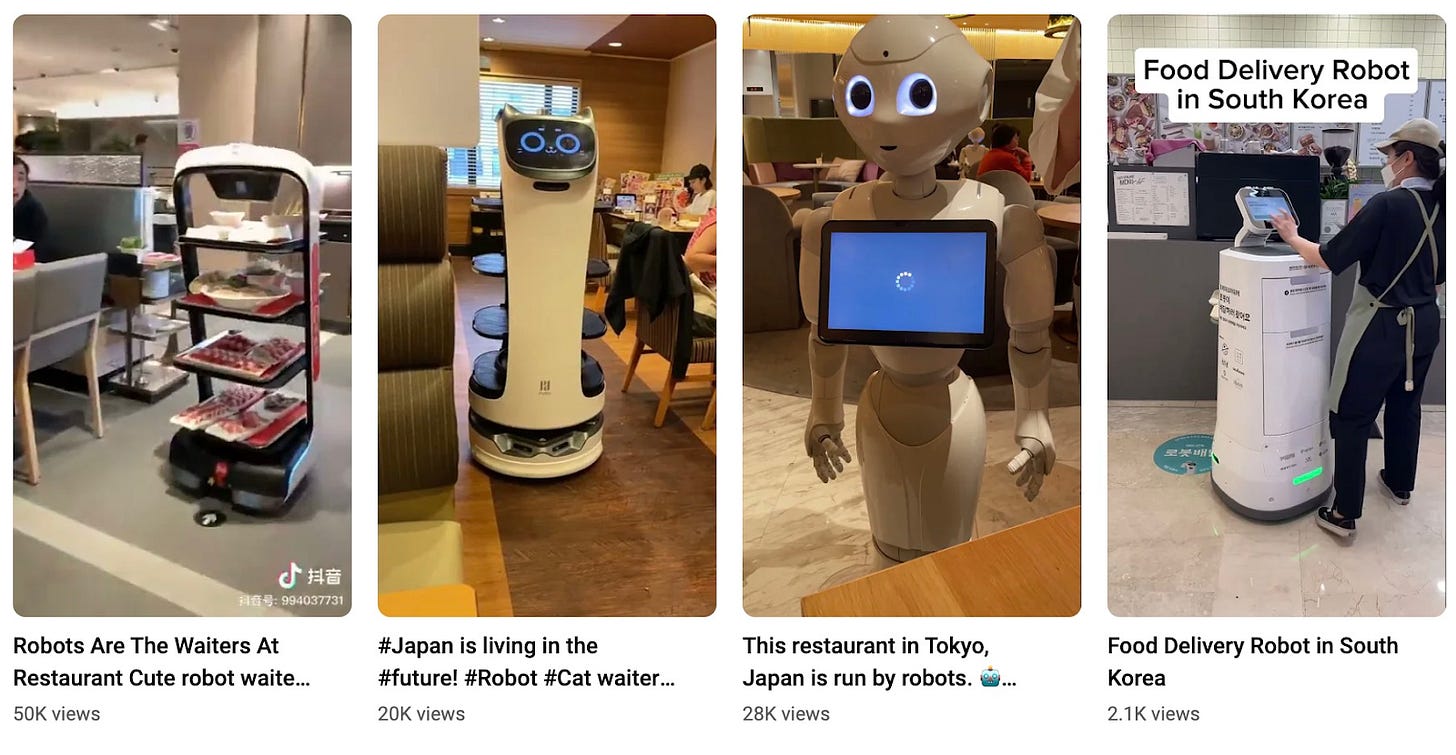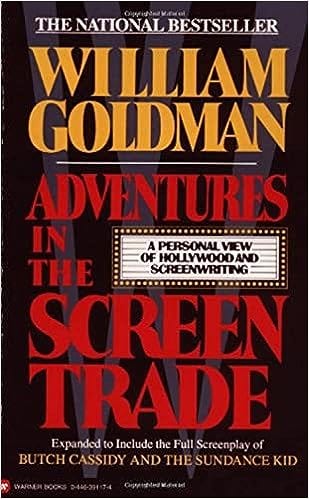Antonym: The 60 Gherkins Edition
The empty square mile, robo-waiters, AI tools getting seriously useful, and book recommendations.
Dear Reader
Missed you.
Let’s get into it.
Gherkins
Small businesses that were kicked on the way down by commercial landlords during the pandemic will have been heartbroken to learn yet more tough times have befallen their erstwhile tormentors. In a piece on Bloomberg News this week, we see a new measurement of that distress. Commercial property’s karmic overhang is measured in Gherkins.
As HSBC prepares to leave an iconic skyscraper in Docklands empty and down-size something more suited to a world where only half the humans ever turn up to the office even when you threaten them:
[…] long-term demand for office space has been decimated by the pandemic, with London estimated to have the equivalent of 60 Gherkins of empty office space last year. Secondly, because the UK’s housing crisis totals some 4.3 million units, according to the Centre for Cities, the average house in England costs more than 10 times the average salary. Lastly, landlords are being urged to reuse or recycle buildings rather than demolish, due to the heavy carbon footprint of the construction industry.
The Gherkin tower is 47,950 sq metres, about 6.5 football pitches. Sixty of those makes a little under 2.9 square kilometres, which is the size of the City of London (the semi-autonomous city-state and financial district in London). Ancient map for reference:
Here I am, brain the size of a planet…
A detail in the FT’s article about South Korea’s robot manufacturers’ worries about Chinese competition, had an amazing stat a few paragraphs in:
About 5,000 server robots were operating in Korean restaurants last year, up 67 per cent from 2021, according to the Korean Association of Robot Industry. The number is expected to double to 10,000 this year.
Ten thousand! What I love is the variety of forms they come in: from multi-storey trays on wheels, to anthropomorphic androids, as you can see in this YouTube selection:
Super-powered productivity tools are coming your way.
Look at what you can do now with Notion!
I’m adding fields to the database that it made of all my Kindle and Readwise highlights — and you can programme those fields with a little prompt: List all of the highlights where I mad a note and what I said. Summarise the book for me. What are the core concepts.
Wow.
This is a taste of what’s coming (soon?) to everyday apps Google Worksuite and Microsoft Office roll out their AI-assisted versions of tools that are a staple of most computer-bound workers today – Word, Excel, PowerPoint will all be very different once the co-pilots and AI features arrive.
What can I see glimpses of in the Notion example:
The opportunity to make much more of things that we create. I’m finding that when I take a note or have an idea that it can be made richer and more useful in moments by sprinkling a little generative AI on them.
Less knowledge left behind. The page in Notion above had been created automatically from highlights and notes I’d made in Kindle.
Intranets may be useful again. This is not a new thought, but I think there will be creative ways for curious minds to pull more together from fragments and forgotten stashes of knowledge on corporate intranets. It will depend on how the tools are configured and how well people are trained on using them.
Entrepreneurial / intrapreneurial types may find ways to boost their productivity soonest. Notion has some large corporate clients but in the main it is the tool of choice for smaller business and entrepreneurs. Those that take notice may be able to use features like this to steal a march on larger competitors.
The most competent will become super-human, and the most incompetent will become super-annoying but visible. This last point is something that has been on my mind for a while about AI and workhorse daily-use tools like spreadsheets, PowerPoint and word processors.
Better to be an expert with AI than an expert prompt-engineer?
For the several weeks running, the best newsletter article I’ve seen is Wharton professor Ethan Mollick’s One Useful Thing. In August, he was talking about the incredible implications for the creative process that academic studies were revealing – something very aligned with our work at Brilliant Noise – and last week he went to work on the topic of prompt-engineering, the art of constructing questions (prompts) in conversations with generative AI systems.
His post provides a prompt for tutoring that is based on research on effective tutoring techniques. He outlines the elements of a good expert prompt, including role, goal, step-by-step instructions, examples, personalization, and constraints. According to Mollick, individuals can take charge of innovation with AI by creating their own prompts and reference guides, rather than relying on companies to provide infrastructure. It's a fascinating concept that could change the way we think about learning and expertise.
He uses the analogy of each person’s grimoire – a spell book – which is a useful analogy. The more expert you are in your field the more you will use them effectively. A principle to take from this is “prompts by experts beat expert prompt-engineers”. It’s the difference, to keep with the analogy, between a wizard casting a spell and their apprentice getting hold of the spell book and unleashing chaos.
Questions come up immediately about how much of one’s grimoire is a shared endeavour and how much is team work. In Brilliant Noise webinar, Roula Khalaf’s approach at the Financial Times provides a basic template for any organisation:
We will be transparent, within the FT and with our readers. All newsroom experimentation will be recorded in an internal register, including, to the extent possible, the use of third-party providers who may be using the tool. Training for our journalists on the use of generative AI for story discovery will be provided through a series of masterclasses.
That internal register could be thought of as risk management and the building of a powerful book of AI magic for the FT team.
Essentially we all need to:
Experiment to find out what works.
Record the experiments so colleagues can examine and re-use what works.
Provide training in use cases relevant to our teams’ work.
This week I’m…
Listening
Yuval Noah Harari interviewed on the Leading podcast by Alastair Campbell and Rory Stewart. The link is actually to the second episode, in the first they spoke with Harari about his political activism opposing the Israeli government in his country’s current constitutional crisis. In this episode, Harari talks about AI risks around its use to create tools for totalitarianism and financial instruments we don’t understand.
I was interested in his use of vipassana meditation also, which he sees as essential to his work as a historian and philosopher. The practice helps him to see his own reference frames and narratives and how they affect his view of the subjects he is tackling. The most important thing, he says, is to critique and criticise your own systems of belief about the world, the stories you tell yourself, despite how uncomfortable that can make you feel.
Reading
Holiday! So I’ve got back into my reading groove…
Demon Copperhead, by Barbara Kingsolver
But a thing grows teeth once it’s put into words.
On page 76 of Demon Copperhead I fell in love with the book. I’d been fascinated from the first page, then infatuated and then I fell hard…
It’s story that follows the shape of Charles Dickens’s David Copperfield and serves much the same function: great story that shines a light in society’s dark places along the way. The setting is Appalachia during the beginning of the opioid crisis, and the protagonist is a boy caught in the system. It is terrifying, joyful, scathing and hopeful all at once.
I’d been meaning to read this for months and so pleased I had the stretch of a few days holiday to dive in. If it’s on your list, I recommend bumping it to the top of the pile. If it’s not on your list, that’s OK, we’ll look away while you quickly add it…
A Thousand Brains, by Jeff hawkins
I finally finished A Thousand Brains, and have loved the journey. Here’s the whole book summed up in one cheerful paragraph by the author.
I hope that one day every person on Earth will learn how their brain works. To me, this should be an expectation, like, "Oh, you have a brain? Here is what you need to know about it." The list of things everyone should know is short. I would include how the brain is composed of the new part and the older parts. I would include how the neocortex learns a model of the world, whereas the older parts of the brain generate our emotions and more primitive behaviors. I would include how the old brain can take control, causing us to act in ways we know we shouldn't. And I would include how all of us are susceptible to false beliefs and how some beliefs are viral.
Adventures in the Screen Trade, by William Goldman
I guess it’s OK to quote a book you haven’t read if the line is strong enough to stand on its own feet and take a punch without falling down. At some point, perhaps after the 100th time I’ve quoted it, I feel shamed into going and reading. In the case of this book: oh golly, it lives up to my own hype of it.
The slam-dunk power of Goldman’s saying: “Nobody knows anything” is representative of the pith and punch this writer’s energetic style. I was 30 pages deep before I knew it, smitten after the author’s note at the start:
That’s all for this week
See you next week. Have a fun back-to-school week. Thank you so much for reading…
Antony











